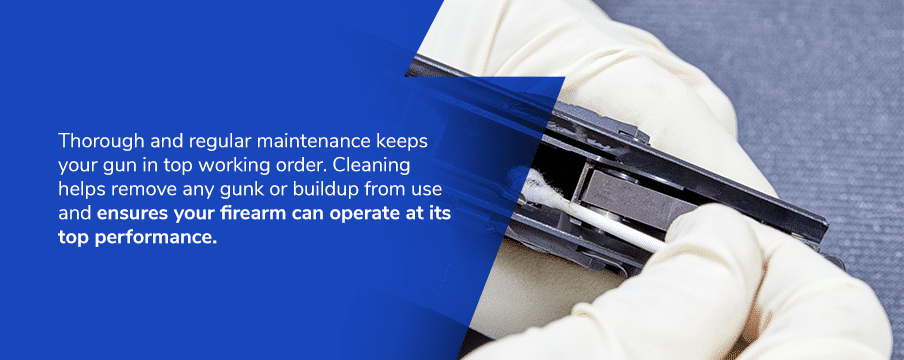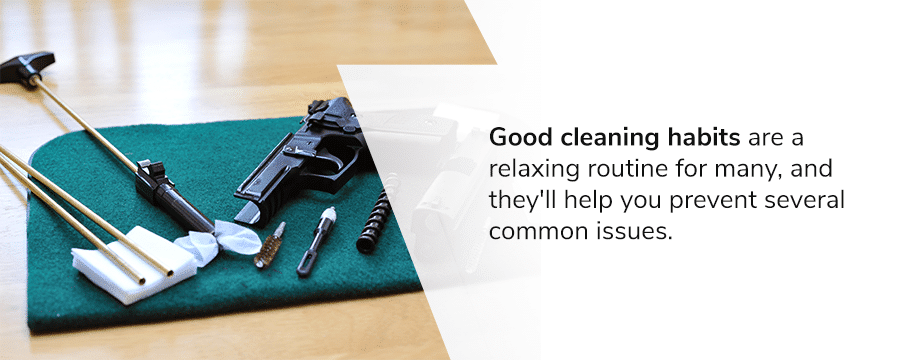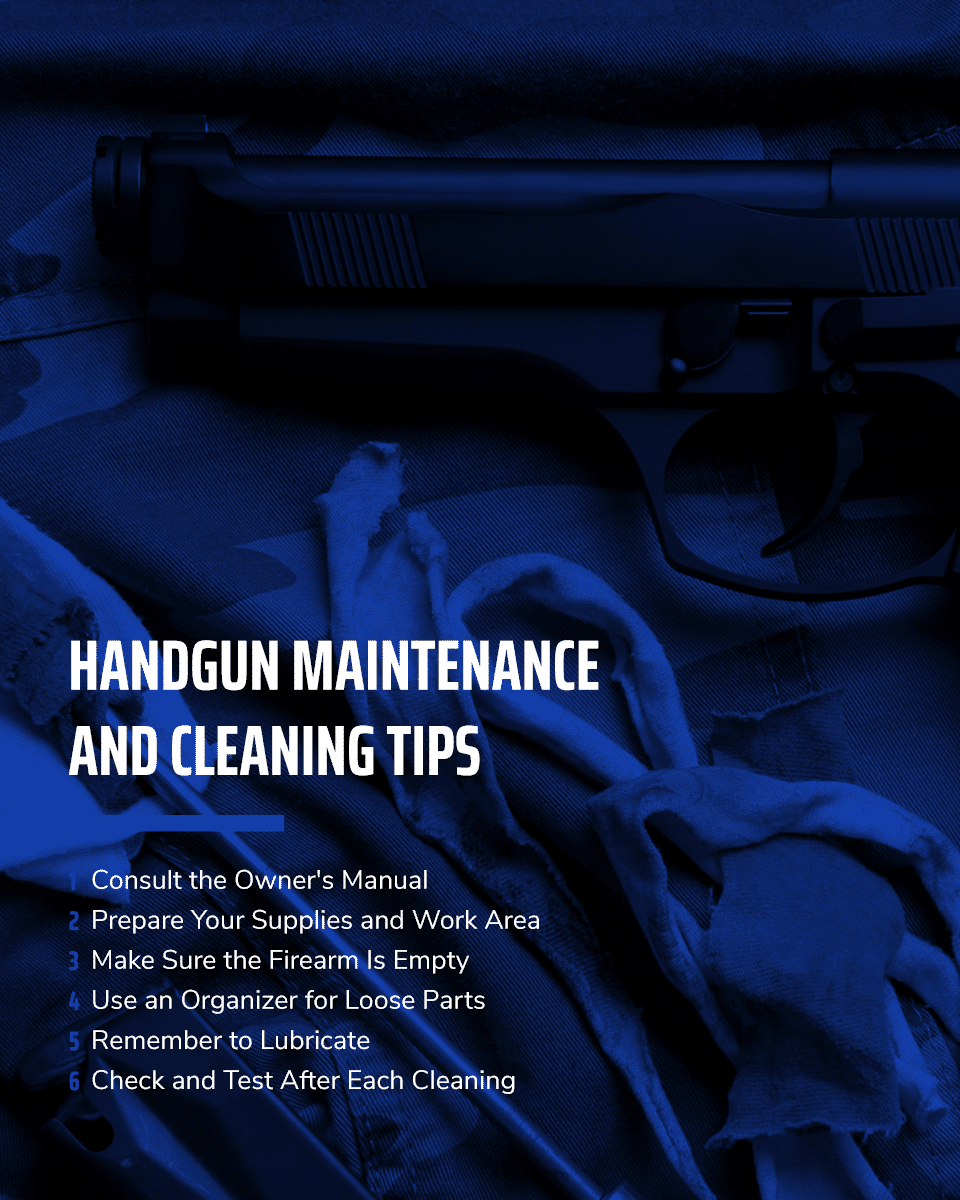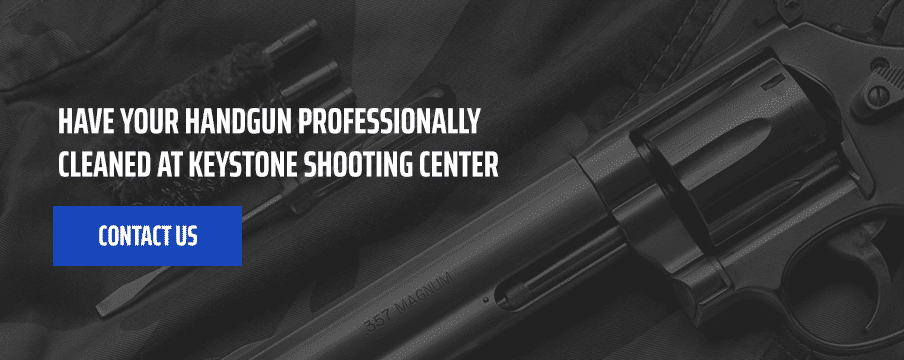People purchase and operate handguns for many reasons. Some visit shooting ranges as a social activity, others enjoy sharpshooting as a hobby or sport and many stay practiced as a means of self-defense. Whatever your purpose, maintenance is an essential part of owning a handgun.
Regular, thorough cleaning will keep your piece operating smoothly and prevent many of the common issues associated with poorly maintained guns. This guide will show you why weapon cleaning is necessary and give you a few tips on proper handgun maintenance and cleaning.
Why You Should Practice Regular Handgun Cleaning
There are many reasons to keep your weapon well maintained, from learning more about the mechanics to protecting your life. By regularly taking apart your gun and thoroughly cleaning the internal elements, you’ll benefit from a well-functioning firearm with a longer lifespan. It’s good for you and for the weapon itself.
Cleaning your handgun will help you:
1. Understand Your Weapon
By taking apart your gun to clean it, you’ll have a better understanding of how it works and what the inner components do as you pull the trigger. A gun is a machine, and all of its parts interact to reach the end goal of propelling a round. But you can’t always see it in action, as it appears to be a single unit from the outside.
Depending on the kind of handgun you have, it may be relatively easy or challenging to disassemble and reassemble. Even if you aren’t particularly interested in the mechanical process that makes your weapon work, learning about the internal elements provides a new level of respect for it. You’ll also have a better idea of why your gun needs cleaning, how often you should maintain it and what parts gather the most dirt and residue.
2. Ensure Reliability and Safety

Thorough and regular maintenance keeps your gun in top working order. Cleaning helps remove any gunk or buildup from use and ensures your firearm can operate at its top performance. If you rely on your firearm for home security, it’s essential that you give it routine attention to make sure it’ll do its job well when you need it most.
When lubricant, residue, dirt and debris collect during shooting sessions, it can build up in the barrel and internal mechanisms. Each time you shoot, residual fouling, which consists of particles from the bullet and burnt gunpowder, sticks in the barrel. Additionally, continually applying oil and lubricant helps the residue stick, as well as dust and other outside dirt. If left to collect too long, it can cause the handgun to gum up, potentially ending in a firing failure or requiring repairs.
Beyond the working order of the weapon, the collected gunk in the barrel can also decrease precision. For sport shooters, the difference may affect accuracy. If you’re primarily using your handgun for home or self-defense, precision and overall reliability are both significant concerns. With regular cleaning and maintenance, you can feel confident that your handgun is reliable and will keep you safe, even in unpredictable situations.
3. Increase Longevity
Handguns can last you from several years to several generations, depending on how you care for them. With a simple maintenance routine, you can significantly lengthen the lifespan of your weapon. The frequency at which you use it will determine how often you should give it a proper cleaning, but even doing the minimum will have a significant impact. Some owners clean their gun after every use, others do so after a few months. It all depends on your uses and how long you expect your handgun to last.
To get the most time out of your handgun, all you have to do is clean it, lubricate it and store it properly. If your handgun has wood grips, you may want to add waxing or polishing them to your cleaning routine. The more thorough you are, the fewer parts you’ll need to replace over time.
4. Learn Proper Lubrication
One of the largest elements of gun cleaning and maintenance is lubrication. There’s a balance to lubricating your gun, where you have to find the right amount between too much and too little oil. It’s a little different with every handgun, and the better you get to know your weapon, the easier it’ll be to find that balance.
Over lubrication can become a problem without cleaning sessions. Too much oil collected in parts of the handgun works as a glue for particles and debris, including unburned powder and carbon fouling. If you continually oil your handgun but rarely clean it, you could end up letting the action get gummed up. Cleaning allows you to remove the dirty lubricant and replace it.
However, under lubrication is far worse for your gun. An over oiled gun may still operate well, especially some of the newer, more forgiving models. But the primary aim of oiling your gun is to reduce friction and preserve the mechanisms that have the most contact with one another. It also reduces the chance of oxidization. Even if you aren’t well versed about what to lubricate, by taking apart the gun, you can see the natural wear marks and get a good idea of where to apply lubricant.
5. Avoid Major Issues
Good cleaning habits are a relaxing routine for many, and they’ll help you prevent several common issues. While they happen to plenty of owners, they can impact everything from bullet trajectory to your gun’s operation as a whole. Rather than wait for a failure or for a small problem to worsen, you can keep your gun healthy and functioning with simple regular cleaning.

With proper maintenance, you can prevent:
- Rusting: There are several different catalysts that can cause rusting in handguns. It can start internally, such as in the barrel, or externally, but by the time you notice it on the outside, it’s likely also inside the handgun. Improper storage and outdoor use can both cause your handgun to rust, as they expose it to humidity and the water in the air. Corrosive ammunition may do the same to the inside of your barrel, as it has a primer that leaves behind salts when ignited. Applying too much solvent without cleaning it out can also cause rusting and pitting, as the chemicals are meant to break down tough dirt. However, you can counteract all of these things with routine cleaning and proper storage in between uses. If you do use corrosive ammo, it’s best to clean your handgun after each use.
- Residual fouling buildup: Each bullet that passes through your gun creates fouling residue in the barrel. They leave behind remnants of carbon from the gunpowder, as well as trace amounts of lead and copper. The residual fouling can build up in the barrel, affecting your precision and potentially your handgun’s reliability.
- Failure to fire: Failure to fire is a common issue with guns that don’t see regular cleaning. If the handgun has enough residue build-up, it may fail to shoot a round of ammunition after pulling the trigger. It’s an error that can become an annoyance on the range or even endanger your life if you’re using the handgun for self-defense. There’s also a chance the live round could blow up in the gun, which is incredibly dangerous. Cleaning significantly reduces your chances of experiencing a failure to fire while shooting.
- Failure to feed (FTF): Lubricant can get in places it shouldn’t be, especially if you over oil your weapon. If it manages to get into the areas that shift rounds from the magazine to the chamber, it may cause an FTF. Essentially, the round never makes it to the chamber, despite activation. A regular cleaning schedule will help you avoid over-lubrication and ensure the mechanisms are functioning properly.
- Failure to eject (FTE): While the other two failures involve the round never leaving the gun, FTE refers to the casing jamming in the barrel. It’s an annoyance and less dangerous than the other two but is also preventable with regular cleaning.
Handgun Maintenance and Cleaning Tips

The exact steps to handgun cleaning depend on the make and model, how often you clean it and even your personal preferences. But regardless of the type of gun you own, there are several common tips out there that will make your cleaning session easier. When you’re ready to perform any kind of maintenance on your weapon, you should:
1. Consult the Owner’s Manual
If you’re new to a particular handgun or need a refresher on how to disassemble and reassemble your piece, the first place you should go is the owner’s manual. It’ll have everything you need to know about the inner workings and mechanisms, as well as how to work with them safely. Pre-owned guns may not always come with a printed manual, but you can request one from the original manufacturer should you want or need it.
2. Prepare Your Supplies and Work Area
Before you begin pulling apart your handgun, it’s best to set up a workstation with all your supplies at the ready. By doing so, you won’t have to keep getting up to look for things while you’re trying to clean. Aim for an area with good lighting and ventilation, as you need to inspect small parts and the firearm chemicals and solvents are often toxic. Use a table or mat with plenty of space to spread everything out and keep your supplies at an arm’s length.
3. Make Sure the Firearm Is Empty
Safety is of the utmost importance when it comes to handgun maintenance. Even if you know the chamber and magazine are both empty, it can’t hurt to check, and the alternative could be highly dangerous. Remove the magazine, open the chamber and store all the ammunition away from your work area. If your handgun has a safety, it’s a good idea to switch it on while you’re handling the weapon.
4. Use an Organizer for Loose Parts
As you’re taking apart a handgun, you’re going to have to handle and keep track of tiny parts, such as screws and springs. If you place them on a flat surface, there’s a chance you may lose the pieces or misplace them. It’s also possible you could accidentally swap parts if they look similar, especially if you aren’t familiar with what screws go where. An organizer with divided sections will help you keep all the pieces organized and prevent you from losing any while cleaning.
5. Remember to Lubricate
Once you’ve finished cleaning, it’s essential to lubricate your handgun. When you use solvents and other chemicals to remove dirt and grime, it can make the metal susceptible to rust. If you forget to re-apply oil and leave the solvent residue, there’s a chance parts of your gun will corrode. Once you notice rusting, it may be too late to fix it, but proper lubrication and storage will prevent it from forming.
Forgetting to apply oil can have worse results once you go to use your weapon. The metal components that strike one another or rub together create friction, and without lubricant, it can cause your gun to malfunction. If you lubricate it right after cleaning, it’ll be ready to go the next time you need it or want to head to the range.
6. Check and Test After Each Cleaning
It’s best to double-check your process and the gun’s functionality after you reassemble it. To confirm your weapon is properly assembled, you can look back to the owner’s manual. It’ll help you identify if anything is missing or out of place. If it looks good, give it a quick function test to make sure the mechanisms are working and that nothing catches or prevents the gun from firing. It’s good to know if anything is wrong before you go to use it next.
Have Your Handgun Professionally Cleaned at Keystone Shooting Center

Whether or not you know how to clean your gun, it’s always beneficial to seek professional help. A trained technician can give your firearm a thorough cleaning and ensure all the parts and pieces are correctly assembled. From providing routine work to supplementing your own sessions with an inspection, Keystone Shooting Center can help you keep your gun functional, accurate and safe.
At Keystone Shooting Center, we understand the importance of keeping your handguns clean. Our technicians break down your gun, clean it, lube it and return it to you ready for action on our range. If you want to learn how to do it yourself, we also offer comprehensive instruction courses to train you on the essentials of gun cleaning.
For more information about the services we offer at Keystone Shooting Range, feel free to contact us with any questions.


 Search
Search 